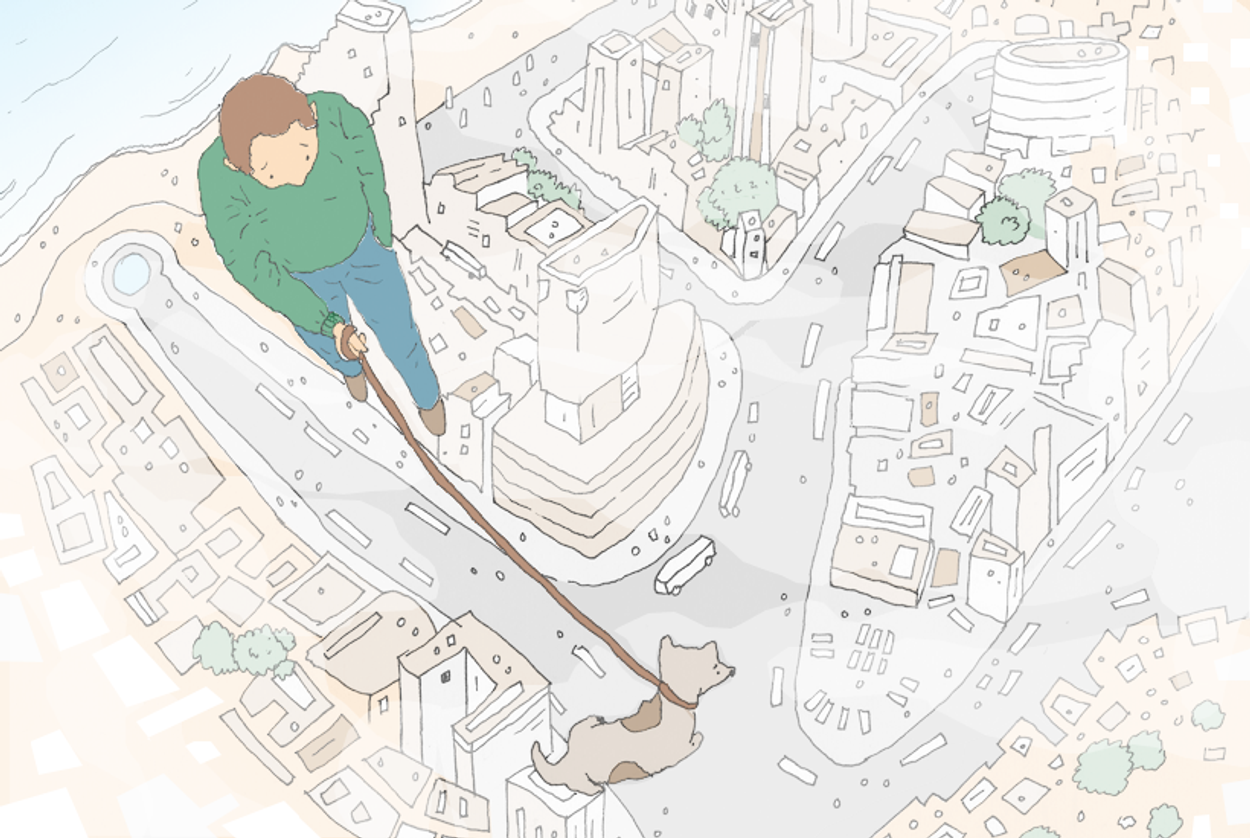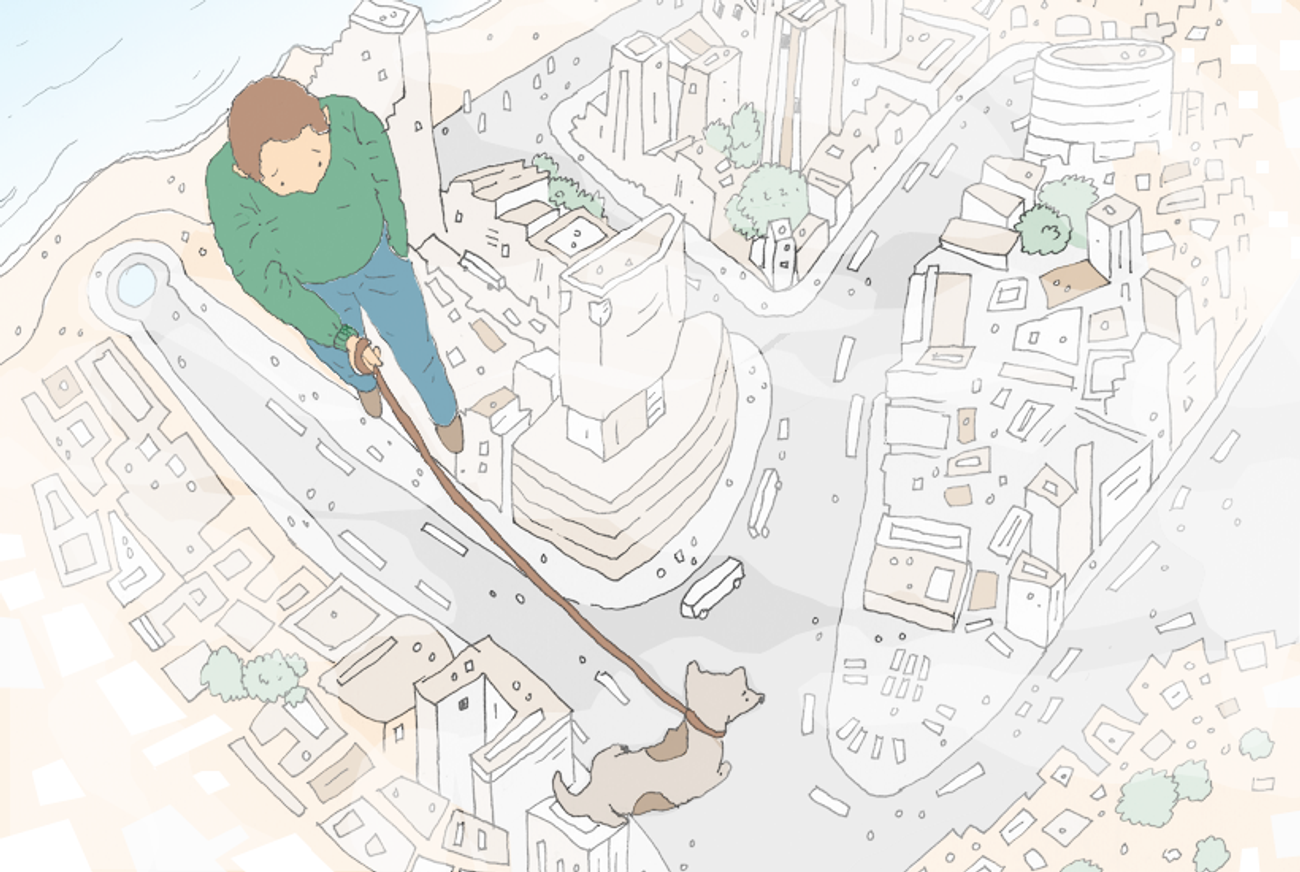Strangers in Their Own Country
Israeli liberals and democrats feel alienated from their government. The upcoming elections could mend that rift.




“Ever since the war, I feel like I’m not here,” says my left-wing neighbor as his dog pees on my fence. “I walk down the street and feel like the soles of my shoes don’t even touch the filth that’s strewn all around me. As if I’m hovering 20 centimeters above the sidewalk. You know what I mean? I’m like a tourist in a country he doesn’t feel part of. It’s a terrible feeling.”
That wasn’t the first time I heard someone talk about the moment he became a stranger in his own country. Some Americans mentioned a similar thing to me when George W. Bush was elected for a second term, and others, on the opposite side of the political spectrum, described having that experience when Barack Obama came into office. A situation in which a citizen believes in a particular administration and gets a different one is common and normal in all democratic countries. But there are less frequent, more difficult moments when a voter feels that the elected administration not only doesn’t represent his views, but doesn’t represent the spirit of his people either.
There have been a number of such moments in the short history of the State of Israel, and it seems that the more social cohesion weakens, the more frequent and intense they are becoming. At the time of the Oslo Agreements, many who advocated a Greater Israel believed the government was deviating from its mandate in its attempt to give the Palestinians territory that they felt had been given to the people by God. That sense of alienation from the government ultimately led to the assassination of a serving prime minister. A no less traumatic event for the Greater Israel people was the Gaza disengagement, when many of them viewed the army, sent to forcibly evacuate them, as a cruel, foreign force and not the army of their people.
And currently, under the most anti-liberal, racist government in the history of the State of Israel, it has become a different public’s turn to feel unrepresented and cut off from its leadership. The name that right-wing leaders use to describe that public, which was threatened and boycotted last summer, is “the radical left.” But that populist designation is far from being true; witness the fact that the President of Israel, Reuven Rivlin, a leading member of Israel’s right wing, is one of most outspoken critics of the government and the non-democratic path it is taking us down. “Left-wingers,” therefore, is a misnomer for all those people who feel that the spirit of the country’s leadership has diverged from the spirit of its people. They might more accurately be called liberals and democrats because they believe that equality and freedom of speech are vital aspects of modern Jewish society, particularly in light of the persecution and inequity our people suffered throughout history.
Over the last six months, Israel has experienced many events that undercut its democratic, liberal character. On the political level, during the Protective Edge operation, we heard our foreign affairs minister call for a boycott of Arab businesses because their owners identified with the suffering of the civilians in Gaza. We saw the provocative entrance of Jewish families into Arab neighborhoods in East Jerusalem, and the no less provocative visit of a right-wing Knesset member to the Temple Mount. In the legislative sphere, several problematic laws were brought to the Knesset table, the most flagrant being the Illegal Immigrant Law and the Jewish State bill, both designed to distinguish between Jewish citizens of the country and those who hold different religious beliefs. But it isn’t only in the Knesset corridors that this combative spirit is raging: Since the abduction and murder of the three teenage boys in Gush Etzion last June, we have witnessed a wave of hate crimes that began with the horrifying murder of a Palestinian boy, continued with unruly demonstrations during the wedding of an Arab man and a Jewish woman in Jaffa, and culminating, a few weeks ago, in the torching of the bilingual school in Jerusalem, which has been one of the finest and most moving examples of Arab-Jewish co-existence in Israel.
There’s no better time than a new election campaign to bring my left-wing neighbor and his dog down to earth again. Instead of burying his head in a good book, he will be forced to look reality in the eye and drop a ballot into the box in what might be the most important elections in Israel’s history. And if he chooses not to, he will be partly responsible for any injustices that follow. Deep down, every citizen in this country knows that the coming elections will determine not only our political and economic future, but first and foremost, the social and moral future of this country. Do we aspire to be, as the original formulators of the Jewish State bill demand, a country that is first of all Jewish and only then democratic, or will we seek to be an egalitarian society that while keeping its Jewish identity does not distinguish between and discriminate against citizens who hold different religious beliefs? Some will say that if we don’t choose the Third Temple we will find ourselves in Sodom and Gomorrah. Others will claim that if we don’t hold onto the Western model, we’ll end up in Iran.
I personally feel that a liberal and non-discriminating Israel is not only a more Jewish-spirited state than any of the other models that the Jewish state bill can ever give us—it is also a much stronger and durable one. But to get there, we’re going to need my left-wing neighbor and the rest of his desperate friends back on the ground, confronting this country’s difficult present on our way to a, hopefully, much better future.
Translated by Sondra Silverston
***
Like this article? Sign up for our Daily Digest to get Tablet Magazine’s new content in your inbox each morning.
Etgar Keret is a Tel Aviv-based filmmaker and fiction writer. He writes a regular column from Israel for Tablet.
Etgar Keret is a Tel Aviv-based filmmaker and fiction writer.